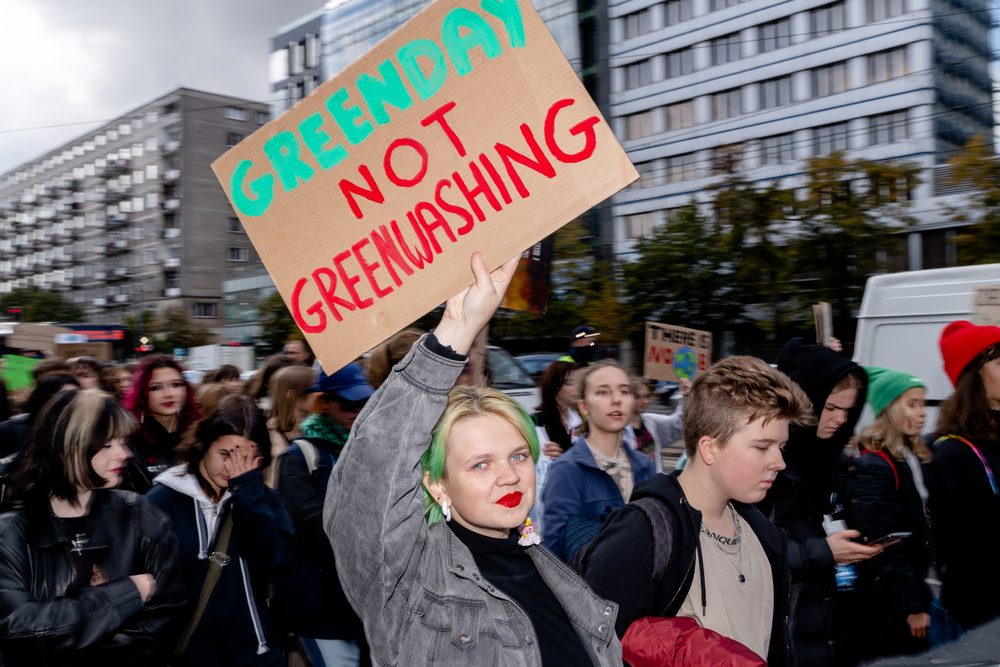Whenever there’s a climate change conference around, there’s one term you can never get away from: “greenwashing.”
What Is Greenwashing?
Greenwashing is the practice of using media campaigns, PR spin, and distraction to deceive the public into believing an organization’s products, aims, and policies are more environmentally friendly than they actually are.
It’s an accusation that can be thrown at anyone and anything pushing any eco-friendly message, but it’s most used to describe the actions of large corporations and governments.
It’s thought the term was first coined in an essay written in 1986 by environmentalist Jay Westerveld. He was staying in a hotel that had one of those cards that says something along the lines of “Help save the planet” followed by an explanation of how much water and electricity is used to wash visitors’ laundry. The card went on to say, if you want to save the planet and not wash your towel then leave it on the rack, otherwise dump it on the floor.
After a quick stay in the hotel, Westerveld realized that this wasn’t about protecting the environment at all, but saving the corporation money by not washing as many linens.
From Governments To Fast Food Giants, Greenwashing Is Everywhere
One of the most blatant attempts at greenwashing in recent history was the Volkswagen emissions scandal. Around September 2015, it was revealed that some models of Volkswagen diesel engine cars being sold in the US had been fitted with a hidden “defeat device” that could detect when they were being tested.
Its purpose was to pump out fewer emissions when the car was being tested compared to when it was actually being driven on the road. Meanwhile, Volkswagen ran a huge marketing campaign showing off its cars’ low emissions credentials.
Very naughty, indeed.
This is a pretty clear evasion of the truth, and Volkswagen was eventually caught and punished for the trickery. However, some other corporate greenwashing campaigns are much subtler.
In 2019, McDonald’s launched a big campaign to shift towards paper straws off the back of the growing public awareness of plastic pollution and the problem it poses for marine life. There’s just one problem: the new paper straws were not recyclable, while their old plastic straws were.
“While the materials are recyclable, their current thickness makes it difficult for them to be processed by our waste solution providers, who also help us recycle our paper cups,” said a McDonald’s spokesperson at the time. They added that they were looking into a solution for this problem.
Accusations of greenwashing are perhaps most common when discussing things like greenhouse gas emissions and pledges to go “net zero.”
Some fossil fuel companies – including the biggest in the US, ExxonMobil – have promised to cut their net greenhouse gas emissions to zero by 2050, which is almost as ridiculous as it sounds. A number of these oil and gas companies with net-zero pledges are still planning major new drilling developments that would push the world beyond the targets set out by the 2015 Paris agreement.
Their promises often sound great but equate to very little in reality.

Young activists marching on streets with banners at a climate change protest in Warsaw, Poland. Image credit: Damian Lugowski/Shutterstock.com
World powers can also be guilty of greenwashing, namely when it comes to their pledges to “go green.” The majority of the world can be accused of greenwashing to some extent, but one easy target is Saudi Arabia, which has pledged to transition to net zero by 2060.
However, they have little-to-no plan for how to actually wean themselves off fossil fuels. The country’s economy and energy demands are still heavily reliant on exporting oil and, likewise, the world relies on their supply. As of July 2022, the country’s publicly owned oil company Saudi Aramco – the world’s largest oil producer – pumped out 12 million barrels per day.
COP Out?
The COP27 climate summit in Egypt kicked off on November 6 2022, and accusations of greenwashing were already kicking around before it started.
Speaking in London in the weeks before COP27, environmental activist Greta Thunberg suggested she was pessimistic about the upcoming climate summit, saying it’s an excuse for “people in power” to exercise “greenwashing, lying, and cheating.”
Criticism has also been mounting against COP27 because one of the main sponsors is Coca-Cola, the world’s worst corporate plastic polluter. Not exactly a good look for an event that’s designed to clean up the planet’s environmental problems.
The sponsorship has angered activists so much that over 200,00 people have signed a petition that calls for COP27 to ditch the drinks manufacturing giant as their sponsor.
“Plastic is suffocating our planet and, year after year, one company leads the pack of polluters – Coca-Cola. Coca-Cola spends millions of dollars greenwashing their brand, making us believe that they are solving the problem. But, behind the scenes, they have a long history of lobbying to delay and derail regulations that would prevent pollution, keeping us addicted to disposable plastic,” the petition reads.
Conversely, COP27 is also looking to crack down on the pervasive problem of greenwashing. The United Nations has just put out a report on the “Net-Zero Commitments of Businesses, Financial Institutions, Cities, and Regions.” In essence, it’s an attempt to improve integrity and transparency in net zero commitments. In the view of the report authors, a country or company can’t just say they’re going net zero, they have to prove it.
“The problem is that the criteria and benchmarks for these net-zero commitments have varying levels of rigor and loopholes wide enough to drive a diesel truck through,” UN secretary general, António Guterres, said in a statement.
“We must have zero tolerance for net-zero greenwashing,” he added.
How exactly this will be achieved is yet to be announced, but it’s clear many people are now striving to reign in this omnipresent problem.
Source Link: What Is Greenwashing? And Why Should It Really Annoy You?